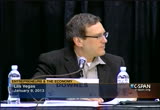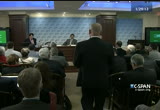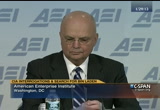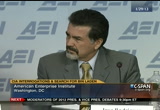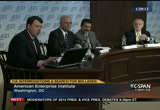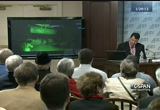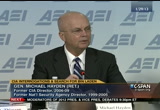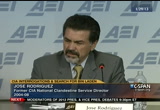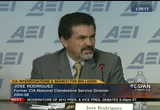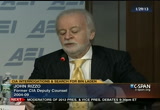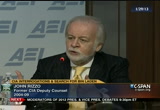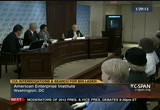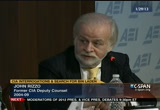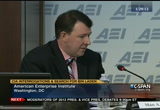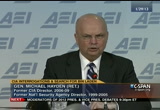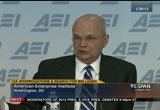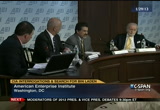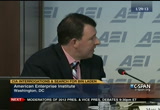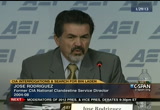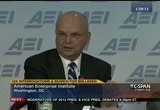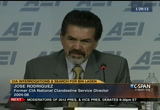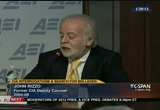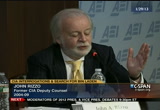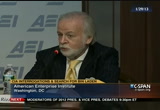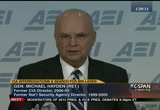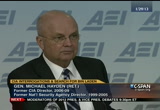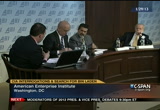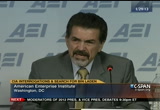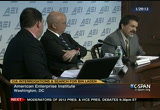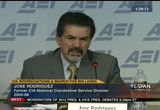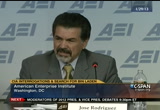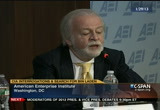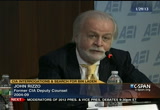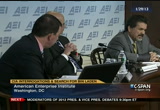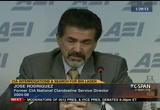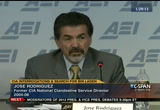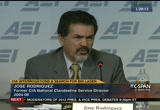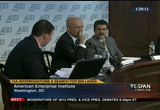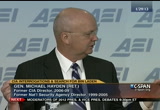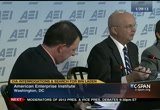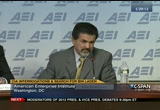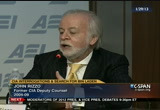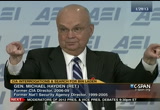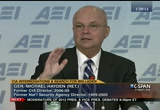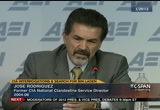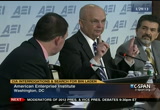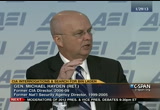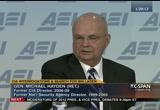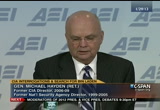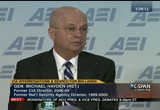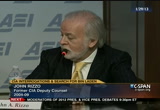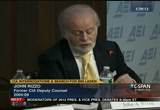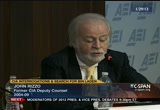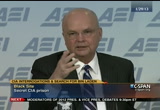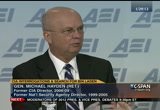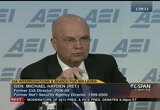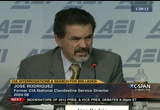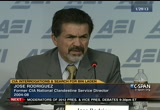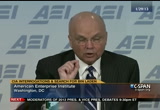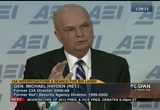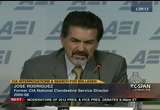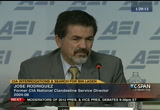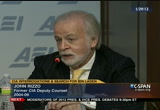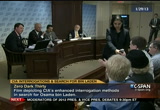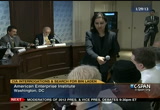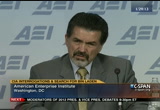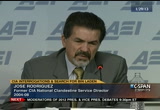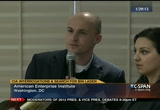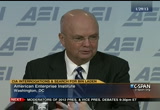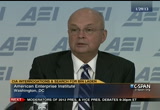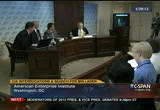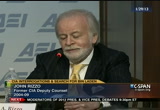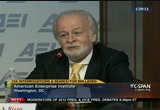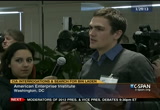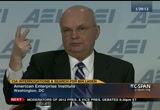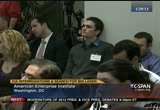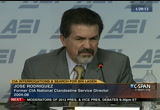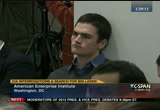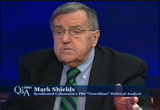tv CIA Enhanced Interrogations CSPAN February 2, 2013 8:00pm-9:30pm EST
8:00 pm
questions and your attention. and thank my excellent catalyst for their insight. [captioning performed by national captioning institute] [captions copyright national cable satellite corp. 2013] >> next, a discussion about the use of enhanced interrogation techniques in the hunt for osama bin laden, after that, the moderator for the 2012 presidential and vice president of the eight talk about their roles in the impact of twitter and other social media. now, a former cia officials for the george w. bush administration defend the use of enhanced interrogations' in the search for osama bin laden. michael hitt and joins former cia counsel who provides the bush administration on interrogations'. . and jose rodriguez. the american enterprise
quote
8:01 pm
institute hosts this 90 minute of that. >> good morning. welcome to this morning's panel. separating fact from fiction. i am a member of a task force on detention and
8:02 pm
many americans will form their opinions based on what they see on the silver screen. it is important for those who know the truth to set the record straight and separate fact from fiction. today, we have
8:03 pm
when he came into the office, the program had been suspended. he was not involved in its initial creation. he conducted a partial assessment. he gathered all the information and had to advise the president whether or not to restart it. he concluded he could not advise the president not to have an interrogation program. we will ask him to explain why that is. jose rodriguez is the former director of the cia service. he was an undercover officer, becoming the head of the cia's counter-terrorism center. including the interrogation program defected in this film. he is the author on what i considered the best book on this topic. he is in my view an american hero. john is the former chief legal officer of the cia.
8:04 pm
he spent 34 years in a cia office of general counsel. he has been called the most influential career lawyer in the cia history. in his memoir, a former director wrote, you do not call in the tough guys in a crisis. call lawyers. get the information they needed while staying well inbounds of the law. he sacrificed personally. before we begin the discussion, let's show a trailer of the film. >> can i be honest with you? i have bad news.
8:05 pm
8:06 pm
8:07 pm
is, the detection of torture is accurate, and their role in finding osama bin laden is not accurate. i want to ask a real simple question. it has been quite an experience going to the movie theater and seeing something you all worked so closely on in your lives. what did you think of the movie? >> i like it. on balance, i am glad it was made. we will talk about that is not quite right and so on. on balance, i am very happy the story was made. frankly, i am very happy because i read the op-ed in a post this morning.
8:08 pm
we will discuss the accuracy, artistic and historical, inside the film. i think it does a masterful job at suggesting that in the real world, there are no right angles and no easy answers to very difficult situations and that was a great service. >> i also like the movies. very entertaining. it is a movie and there are some things i really like and things i did not like. i did not like the portrayal of the enhanced interrogation techniques. i did not like the fact that it made a false link between torture and intelligence successes. i also think torture does not work. our program works because it was not torture.
8:09 pm
there were other things i like about the movie. i like the fact that it conveyed it was a 10 years. and that the agency was the focus of the effort and that it succeeded because of the commitment, dedication, and tenacity of its people. i like the fact that it showed the enhance interrogation program had something to do with the capture of bin laden. human operations, analysis, technical operations, imagery. i also liked it showed the strong working relationship between agency and the military.
8:10 pm
it is a mixed bag. it is entertainment and i like it as entertainment. >> i agree. it was a terrific action flick, about 20 minutes too long. [laughter] the final takedown was done in real time. riveting. and how the technique came to be and the safeguards we put on them. all the monitoring by medical personnel during the course of the interrogation, is a movie.
8:11 pm
the character in the marvy, the interrogator, making stuff up as he went along, not talking, bring on the water, get a bucket. people ask me about the box. most of you know one of the techniques was a box, putting a detainee in a box for a limited duration. the box in the movie is not the kind of box used. when i say all this, i do not want to downplay or leave any
8:12 pm
impression that the actual water boarding was tame or benign. it was a very aggressive technique, as were all the others. i went into it telling myself it will be a movie. i was relieved there were no lawyers involved in the movie. [laughter] i would expand the next four years at a cocktail party explaining why i was not that lawyer. on the whole, it was a mixed bag but a terrific movie. i think it did really taking no sides. i think there were complicated moral questions, especially in the first few scary months after the 9/11 attacks. >> you were the chief legal
8:13 pm
officer at the time. would you have authorize the interrogation techniques as they were depicted? do they just throw someone on a mat and pour water on their heads? >> no. the interrogators were not allowed to ad lib. there were certain specific memos. there was a meticulous procedure to undertake. before use of the water board, they will confirm this, the interrogators at the site would have to come back in riding and explain why they thought the water boarding was necessary.
8:14 pm
it would be approved at headquarters. it took the cia director to approve the use. the box is not pleasant. there was a big box authorized you could stand in and a smaller box. it did not appear to me to be quite as small as what was depicted in the movie. but yes, there was a box technique. everyone can look at it a different light. i had the impression in this seen the guy was ad libbing as he went along. that was far from the reality. >> one of the scenes, the interrogator throws the detainee down and pours water in his face and shouted, when is the last time you saw bin laden?
8:15 pm
there is a difference between interrogation and debriefing. the purpose of interrogation, we do not ask questions we do not know the answer to. >> hollywood has got to compress everything. there are no lawyers depicted in the film. one station chief for 10 years. [laughter] things are bad decompressed. reality may have just been too long a story. i am almost willing to make an absolute statement that we never asked anybody anything we did not know the answer to while they were undergoing the enhanced interrogation techniques.
8:16 pm
the techniques were not designed to elicit truth in the moment, tell me this or i will hurt you more, i am not your friend. two thirds of our detainees, it was not necessary. i am willing to admit the existence of the option may have influenced the two thirds who said, let's talk. for about one-third, techniques were used. not to elicit information in a moment, but to take someone who had come into our custody, absolutely defiant, and move them into a zone of cooperation whereby, you recall the scene in the movie after the detainee is cleaned up and they are having this lengthy conversation. for the rest of the detention,
8:17 pm
it is a conversation. it is a debriefing. it is a going back and forth. a lot of people reflexively say they will say anything to make you stop. that may be true. that is why we did not ask them questions while this was going on. again, john said, these things were not kind. but the impact psychologically, you are no longer in control of your destiny. you are in our hands. that movement into the zone of cooperation, as opposed to the zone of compliance. >> usually, the interrogation program lasted a few days, and in the case of some, a few weeks. it was a finite amount of time. the justifications for the use
8:18 pm
of the techniques said that we could not go beyond 30 days. they had very specific information regarding how long it could be and how long we could pour water. it was very well controlled. pretty quickly, he recognized within 10 seconds, we would stop pouring water. it was figured out any started to come up with his fingers up to 10. he would let us know the time was up. >> tell the story you have in your book about what was said to our interrogators after being water boarded. >> it was interesting. it gave us the explanation.
8:19 pm
the explanation was the brothers needed religious reasons to talk. once they felt they were there, they would then become compliant and provide information. he basically recommended to us we needed to submit the brothers to this type of procedure if we wanted them to cooperate. to help them reach the level where they would become compliant.
8:20 pm
>> to do so without sin. this narrative was my summer of 2006 trying to make judgments on the overall effectiveness of the program in the past and what would be a legitimate program going for it. -- program going forward. circumstances had changed. this story was important for my own soul-searching on this because, in other words, i was not trying to prove the point that what we were doing was universally applicable. it was well suited to this group. whose believe was founded on metaphysical principles. obedience to the will of god. this story told about creating -- allah expects us to obey him, but he will not send a burden bigger than we can handle.
8:21 pm
i can speak to you without fear of hell. on the outside, some tried to expand the debate. to suggest we are trying to suggest some kind of metaphysical macro principle applied to all time. that may be true but i was not interested in that. i was focused on what was happening here in this world. >> they reached the point where they felt they could talk. once they reached that point, these are very egomaniacs people. they have a big huge egos and they cannot wait to tell you how evil they are. they just started talking. they would not stop.
8:22 pm
>> that philosophy started. if you read the looming tower, he was tortured and gave up one of his close confidants. the person came to him and said, you are ok. you resisted. he resisted as far as you could. no one could have undergone it. you did the right thing by giving me up. he was one of the people who trained them in towner interrogation techniques. this is the philosophy spread throughout the group. but we see in the movie that --
8:23 pm
how many went -- under went water boarded? he told the red cross it was five times. no one seems to believe him. could you expand on that? >> he was never waterboarded. he was the last detainee who was subjected to it before we had to suspend the program. it stopped midstream. it earned him a footnote in history, i suppose. this issue of numbers, how many times, how many times they were they waterboarded, this arose in 2004.
8:24 pm
it was by the obama administration when he came into office. it depends on the way you count them. the actual applications lasted matter of seconds. if you think he was left at 83 sessions, i do not want to say that what these guys went through was not very aggressive. it simply, those numbers are just way out of bounds and had been misinterpreted in subsequent years to as to the particular organizations.
8:25 pm
8:26 pm
right now the only people we still waterboard are american people, americans in uniform. waterboarding continues, it is not the terrorists. let's turn to the question of the role that detainees played in the hunt for osama bin laden. if you can walk through the role and how it affected it. >> we are anchored on the movie. is the movie a lot more subtle than those who have not seen the movie? feel free to comment. after reading commentary about the movie, i expected this nonstop linear short line between an interrogation session and boots on the ground. there is an awful lot of complex intelligence work that is shown
8:27 pm
in the movie, for which i do not think the movie gets credit. i do want to make that point. when i was first briefed, and i think it was late 2007. it may have been very early 2008. the team came to me and said "we think we're onto something here." what we think we've portrayed correctly was the obsession people tracking down osama bin laden. this is a very broad team. these folks have been on one or another different hypothesis. they came to me and said "couriers." we think this is going to be a very positive line of inquiry. we have some information. we know we are communicating. we're confident it is not electronically giving the other means. we would have detected that. it must be face-to-face. we have leads on couriers. they laid out a whole series of paths they were following.
8:28 pm
one was information derived from cia detainees. it was just mentioned in passing. we were not trying to prove a principal or refute an argument or anticipate the script of a future academy award nominated movie. it was just part of the flow. that is what i tried to suggest to you. it is almost impossible for me to imagine anything like that happening without making use of this costco-like storehouse of intelligence information that we gained over the years through detainees. and the ability to go back to the detainees and challenge their information or to prompt them with new information.
8:29 pm
let me suggest one other thing. in an attempt to create the argument of a linear connection, very often stuff you have in your possession takes meaning only from information later discovered. that kind of costco warehouse, something last seen from "raiders of the last arc" starts to glow. it is something you have learned in 2007 or 2008. you have to treat this as a tapestry. that is the only way to consider it. >> one of the things you told me was that intelligence is like putting together the puzzle without the box. >> it is like putting together a puzzle that there are no edge pieces and you do not get to see the cover on a box.
8:30 pm
there are a whole bunch of puzzle pieces that do not belong to this puzzle. if you can talk to someone who has glimpsed the cover of the box, and that is the detainee, it eliminates an awful lot of things you may already possess but cannot quite fit into the pattern. >> in this case, the man who drew the cover of the box. >> the movie is about the information to get osama bin laden. there's a lot more to this story. that is the destruction of al qaeda. the enhanced interrogation program was key in destroying al qaeda. osama bin laden came 10 years later. we had a number of terrorists coming after us with plots.
8:31 pm
we were able to capture them, kill them, destroy the plot, wrap them up because of this program. we can go into detail in terms of everything that happened, but enhanced interrogation programs were the key to that. >> a follow up. take us back to september 1, 2001. there is smoke in the ground in new york. the pentagon is broken. what do we know about al qaeda? did we know that members of this network, all this information we take for granted now? >> we did not know that much. we did not know who was responsible for 9/11. we had a few assets that provided us some peripheral information.
8:32 pm
we did not know very much. it took a long time for us to be in a position to really learn what was going on. in march of 2002, we captured al zabeta. we recognized that we had to do something different. contrary to what some people are saying, he initially provided a couple of pieces of information. then he shut down. we knew they were coming after us in the second wave of attacks. we knew that they had a nuclear program. they had a biological weapons program. we thought we needed to do something different. that is when the enhanced interrogation program came into existence. he went through the program, started in august of 2002 for 20
8:33 pm
8:34 pm
me was after 9/11 we had a legal program to get the people who had done this to us. we also had a program to get some of these people alive and find out what we know. in this situation it is not optimal. you want to kill terrorists but it is not always optimal. it seems to me our policy is to vaporize all the intelligence with drones. is that an optimal situation? >> certainly in the wake of the aftermath of the 9/11 attacks where we were trying to pull together a program that would elicit the information that our experts were convinced were keeping from us, i can tell you. i was there from the beginning through the end of the program.
8:35 pm
the cia is an intelligence collection organization, first and foremost. it is in agencies dna to want to collect intelligence from all sorts of means, especially human intelligence. you cannot collect human intelligence from a dead guy. the absolute priority was to thwart the next terrorist attack, which in 2002 everyone, including the people at the cia, thought was only a matter of time. the priority from the beginning with the others was to take them alive. he was captured in a firefight in which he was seriously wounded. the agency sent doctors over to bring him back.
8:36 pm
it was not out of compassion but he was no good to us dead. the collection portion for years was paramount. lethal operations was not the first option. it certainly was not the only option for those of us at the time. >> one of the critiques of the program is that ksm underwent waterboarding and all the rest. he still lied about others. you have a fascinating story in your book about how we discovered that he was actually covering. can you fill us in? >> usually they will not give you the 100% of the information they have in their minds.
8:37 pm
it is not going to happen. this is not a "push button, get a banana type of thing." he was so vicious. -- vociferous. we smelled a rat. they were communicating with each other. they did not think we knew. we did not tell them that we knew they were communicating with each other. we intercepted a communication between khalid sheikh mohammed and some of the other detainees in which he said "do not say a word about the courier." that told us a lot about the courier. he speaks to the importance of having a place to take the individuals.
8:38 pm
we could use that type of communication. we could use it to check a name. it was very helpful for us. >> after the osama bin laden raid came out and the word came out that interrogations played a role, senator mccain gave a speech and said that the first mention of mohammed al-qahtani came from a detainee held in another country. we did not render him to the country for the purpose of interrogation. that statement is technically correct. it is deeply misleading. not intentionally. it implies that we knew all this before hand and we're now just saying we got more information. can you explain why that particular, why it is important that the program was not critical to it?
8:39 pm
>> you're probably talking about another the first mentions, he mentioned it in passing. at the time, which was 2002 or 2003, it did not mean anything to us. a security expert for al qaeda, it was not until we got our own information from a facilitator in 2004 that we learned that al- kuwaiti was the courier for osama bin laden. at the time it did not mean anything to us. it was like saying josé the puerto rican.
8:40 pm
what meant something to us was the fact that we got validation that there was one courier who was osama bin laden's principal way of communicating with al qaeda central. it meant that osama bin laden had taken himself out of the day-to-day running of al qaeda, that he had decided for whatever reason that he was just going to run the operation long distance, recognizing that it was going to be a lot less effective to run an operation like that from far away. it also told us that finding osama bin laden would be a lot more difficult. al-kuwaiti was his true name and go out and find him.
8:41 pm
the information that was obtained at the site although not complete was key. it is what is important in the eventual take down of the man. >> i mentioned the article this morning about this movie being a national rorschach test. you will see what you want to see. sometimes we talk past one another. you just saw jose's description and mark's. it is a tapestry. it is complicated. when john wrote the report he said that there is no evidence that any imminent attacks have been stopped for the cia interrogations program. let's let that stand on its
8:42 pm
merits. let's not even challenge that. that then is taken to mean the program therefore was not effective. you cannot prove this close, immediate, if it did not lead you to tackle someone who is around on the rooftop right before the attempt, then it did not count. breaking up the financial network 18 months earlier, disrupting the courier, you get the point. sometimes it gets bollixed up. we had all the letters here.
8:43 pm
we are mixing and matching. i think that gets lost. >> one example is the takedown of the cell where you had ksm getting information that he gave $50,000. then you take that information. he gives us the name of the person that he gave a description and the phone number. that information, you then would lose analysis on on that phone number. it was critical to that. all sorts of intelligence aspects get involved. >> you cannot separate any single source, any single discipline, any single thread. maybe we could think of one. that is not how it normally happens. it is reflected with the detective work that goes on once you leave the emphasis on these sites.
8:44 pm
>> you once called the bluff of the deniers and suggested that it produced no information. why do we not sure of interrogations reports? we have the intelligence committee now. no one has seen it. they claim it says that no information useful came from enhanced interrogation. why do they not pass a law saying it should be destroyed and never used again? >> i was feeling prickly when i wrote that. if you think it is all invalid
8:45 pm
and all illegitimate, in our legal system, if you pose it on ethical grounds this never works. let us know. we will clean out the files. it is an overwrought challenge on my part. you see the points that i'm trying to draw here. this was important. let me tell you what you threw away. you threw away the 9/11 report. >> i think it is a ridiculous assertion when a report says that the enhanced interrogation program had no value or produced nothing. it is disturbing. in my view, it is an attempt to rewrite history. the narrative of this administration is that the enhanced interrogation program was torture and nothing came out of it.
8:46 pm
in fact, we were able to destroy al qaeda because of it. i do not know how they can spend 3.5 years spending i do not know how many millions of dollars and never interviewed any of us and come up with a statement like that. i do not understand that. >> it does not make any sense. it does not compute. nothing? nothing? thousands of reports produced zilch? we can argue about what role it played. this administration and
8:47 pm
reconfirmed by the current acting director, the program did play a role. this is a complex picture with many different strands intertwined. we can argue about how big a role it played. it just defies logic for someone to take a position that none of it, none of their reports, none of the detainee reporting made any difference at all. do not buy that. >> mike once compared the deniers of the cia program to birthers and truthers.
8:48 pm
there seems to be an obsession of critics to deny the efficacy of the program. if you look at a movie like "zero dark thirty," kathryn bigelow says she acknowledges the effectiveness. it is a valid position to take. why are people so obsessed with trying to disprove the obvious, that we got information? >> i may be a little edgy in my response. i am pointing to the broader american public. i'm talking about the national psyche, not anybody in and out of office. just you. part of a collective. the american citizenry. let me tell you a sentence i never heard of director of the cia.
8:49 pm
"i know this is bad, but what ever you do, do not overreact." i never heard that. i can document a whole bunch of conversations that were way on the other side. it might be as part of a national consciousness a moral struggle for some and our citizenry or national political culture that they are trying to deal not with that we did it but that they did not mind it. or they did not mind it at the time. or they did not mind at the time strong enough to say let's not overreact. let me give you the intelligence officer's lament. this is whining. we're often put a situation where we are bitterly accused of not doing enough to defend america when people feel endangered.
8:50 pm
then as soon as we have made people feel safe again we are accused of doing too much. i realize that is my fault, my whining. everyone may not share that view. every now and again in a self pitying a moment i allow myself that thought. [laughter] >> look. i agree. whether we do these types of programs ever again, it is up to the president. it is up to the american people. they can choose. what i take exception to is trying to say it did not work. we need to be honest with ourselves and do an honest assessment of the value that this program brought.
8:51 pm
we may have to do something like it. it is a dangerous world out there. >> let me ask you a question. are we less safe today because this program has been curtailed? you developed a program that was handed off to any administration. it has been eliminated. what is the effect of that? >> honest men can differ about this. i respect honest men who differ about this. the individual can form a sentence saying i did not want you to do this.
8:52 pm
i have issues. i do not want you doing this even though it may have helped. you and i are coming from the same political culture. we have a meaningful discussion about what it is, how much risk do we want to embrace as a people? when i became director in 2006, i concluded that we are not the nation's jailers. we are the nation's intelligence service. there cannot be an endless detention program where we keep people.
8:53 pm
i spent the summer of 2006 talking to people saying we ought to move these people out of cia custody. because the value of most of them are off to a point that other factors were becoming more dominant in the equation. over labor day weekend we lost 14 detainees to guantanamo. i also attempted a dialogue with congress. i recognized that if this were valuable and said we need some kind of program to go forward, we needed this option. i was not prepared to tell the president do not worry about this, you'll never need this in the future. i also knew it that the preservation would depend on a whole bunch of factors. one was need. how much more do we know about al qaeda now? how many more human and other intelligence penetrations of al qaeda do we now have compared to where we were in 2002? a lot changed.
8:54 pm
things that were lawful in one circumstance may not be in another. this had to be america's program. it could not be the cia program or the bush administration's program. there is no success if you are running an on-off switch every two years. i was willing to revamp the program and make it more narrow. it takes it off the table and able to preserve a program that is politically sustainable. that is pretty much what we thought we did. that is the dialogue we have with the incoming obama administration. i began my longest conversation with them at the agency, something along the lines of i think we have already done what you have done.
8:55 pm
it is appropriate in the new circumstances. it did not hold. all american detainees under any agent of the american government have to be treated with the army field manual. it was proved in september 2006. i would suggest the casual manual was written with the knowledge that there was option b. that this program was also available. now we are left with this option a. it should not concern you. before you get to interrogation,
8:56 pm
you have to capture and we do not capture. we have made it so legally difficult and so politically dangerous to capture that it seems to the outside looking in that the default option is to take the terrorists off the battlefield in another way. >> could you talk a bit about what obama inherited? we had moderate sleep deprivation. tummy slap. a diet of liquid ensure. i'm sure the product owners would love to hear that is torture. >> we assessed the political realities. we assessed the legal decisions. they said what techniques do you have to have to ensure the continued efficacy of the program? they came back with the set of scaled-down techniques.
8:57 pm
waterboarding was off the table. sleep deprivation. plus what you call the basic techniques. the box was gone. it was definitely a far less progressive program. it remained viable and effective. we took part of these briefings of the obama administration team. we thought we had a program that was viable, limited, politically and legally realistic.
8:58 pm
one by way the entire intelligence committee have now been briefed into. to digress for a second, the major mistake we made, and i include myself in this, was in the early years of the program. the existence of the program, it was limited to the gang of 8. i think that was a mistake. by 2006 both had been briefed. we thought it was possible. we thought the obama administration could have continued the program in this limited form, at least maintained it as an option.
8:59 pm
it did not come to pass. i do not think any less realistically thought they would stick with it. we had not reviewed the executive order. guantanamo was out of our lane. this is a factual flaw in the film. they were saying this is not factually correct. we got a hold of the executive order again. all government will be confined to the techniques in army field manual. my friends and i have talked about this. i said not that you ask, this is not occurring on the executive order.
9:00 pm
let me offer you a thought. down here it says all agents will be confined to the techniques in the army. i said if you would just put the phrase "unless otherwise authorized by the president" you might be able to buy back an awful lot of flexibility. what we needed most of all was ambiguity in terms of someone coming into american custody, being quite sure what would happen. that has not happened. that was the last thought we had on the process. >> you mentioned even if it was a blank page this would have made an effect. one of the last detainees that came into the program, i cannot
9:01 pm
remember the name of the individual. he came into custody. he was told we are the cia. he said i will tell you anything you want to know. >> the cartoonish version of it is let me tell you who we are. i heard about you. he was actually cooperative. >> just the existence. >> yes. back to the ambiguity. one thing that does come across in the movie, but you have to watch it very carefully, the most powerful tool we had in every interrogation we conducted was our knowledge. not one or another technique. >> once you got through the enhanced interrogation process
9:02 pm
then the real interrogation began, the debriefing. that is with the skill and knowledge with the people who were conducting the sessions. the knowledge base was so good that these people knew that we were not going to be fooled. we had other prisoners in our sights. we would be able to check information against others. they knew that. we mentioned the takedown. they did not know how much
9:03 pm
khalid sheikh mohammed had told us about $50,000. we would go and give him what we have heard from khalid sheikh mohammed and he thought we had given him all the information. he provided the names from there. it was very well done. the credit goes to the agency analysts and others who participated in the debriefing of his terrorists and wrote thousands and thousands of intelligence dissemination, which we would read every morning and were amazed at the information that was being disseminated. it was an incredible effort. >> this program gave us an enormous amount of information about al qaeda in pakistan.
9:04 pm
the administration continues to use the intelligence every day in drone strikes. it is not just actable intelligence but how they operate. since the program was shut down we have seen the emergence of al qaeda in the arabian peninsula. we have had the emergence of al- shabab merging with al qaeda central. and al qaeda in africa. are we struggling in a way? the information we have on pakistan and the lack of information, is it harder to get the intelligence we need because we do not have this tool?
9:05 pm
>> one of the most important threads of information that i saw when i got there and still in 2006, late in the game, was detainee information. i already suggested to you that i am willing to adjust the detainee program. we have other penetrations and sources and knowledge. we have a better sense of the imminence of attack, what state of danger we are in as a nation. i told you we entered the black side in 2006. lazy journalists sometimes they we closed them. we did not. we kept the option open for the
9:06 pm
president. between that date and the time i'm leaving, we captured two people. it isn't setting indoor records compared to what we have done. it had become far more difficult to do this. i understand that. i do. to go back to my earlier statement. we have made it so legally challenging and politically dangerous. you tell the bureaucracy that is an option. it is electrified. i know how bureaucracies respond. that option does not flow to the top when you began to explore things. what you're getting is a little bit different than the white house saying all options are on the table. that is probably correct. in the real world what i just described for you makes a real difference.
9:07 pm
let's make it christmas night 2009. let's make a conference call with the guy who tried to explode his underpants. it is christmas night. who is in town? you have everybody on the conference call. the attorney general says we have a team, talk to him. we are going to send a clean team in there. put that aside whether it is a good idea or bad idea. can you imagine the guy at the cia on the conference call going "excuse me, attorney general, i've got another option for you to consider." i cannot imagine that happening because of the broader political, cultural context we
9:08 pm
have created. it is so legally difficult and politically dangerous that we seem to be absent. >> eventually your own government will come after you. this was 2003. we had tremendous support from the congress and the american people to make sure we were not attacked again. we kind of laughed. the problem is that a few years later many of us were being investigated. the agency was being investigated. the concern that i have, frankly
9:09 pm
to this day, is the chilling effect it has on the leadership at the agency. if tomorrow there is a big crisis and they say we're going to start x and there was controversy and risk in it, people are going to say look what happened in the past. despite the best efforts, we still had to face a lot of investigations and bills and indictment and stuff. i fear for the safety of our national security because of that. maybe am overdoing it but i have a great concern about it. >> looking down the road, let me indulge.
9:10 pm
hagen advised that you cannot kill everybody. detention must be an option left on the table. theoretically i suppose it is an option today. the reality is there has been a grand total of one detainee captured since the program ended. we cannot kill this threat by killing this threat. i will leave that at that.
9:11 pm
>> i wanted to open it up to questions from the audience. >> i am an open source intelligence person. in the movie, they have a portion where they take the gentleman and get them a very nice plate of food. the guy is apprehensive. the issue is we put you back in there but you do not have to eat this. the movie is criticized for the enhanced interrogation techniques but when someone
9:12 pm
decides to cooperate, one thing that is not always acknowledged is that once you get them to cooperate sometimes just giving the option to have something better, that can get them to talk. i was wondering what would it be in your experience, when you're not dealing with someone like khalid sheikh mohammed maybe you have some of the mid-level guys who are not as radicalized. what experiences you have with someone, them off the liquid food diet, helped turn the table to give them something? >> the whole program was designed around providing rewards for good behavior. they got a lot more than just good food. they got the best medical care. they got books. they watched movies.
9:13 pm
it was pretty good. they appreciate it. it was part of the program. >> we talked about the dvd collection at guantanamo. [laughter] >> how did you get the true identity of osama bin laden's courier? would you have been able to track him down without using enhanced interrogation? >> as i said, we got the information of the courier from a facilitator who went through the enhanced interrogation
9:14 pm
program. it was not until some years later that we were able to get the true name of al-kuwaiti. that was through human collection capabilities. that was the importance intelligence that provided real information on the person that was the courier. the facilitator provided good information, the lead information, that allowed us to narrow it down. it was intelligence traditional work that led to the identification of al-kuwaiti. >> would you have been able to get him without enhances
9:15 pm
interrogation? >> it provided the lead information on osama bin laden. the enhanced interrogation program was much more than just getting osama bin laden. it was protecting the country and saving american lives. it allowed us to do it for 10 years. >> a couple of factual questions about the film. the main character, was that a fictional composition of different people who were looking after bin laden? i understand this is classified. was there one person that was really that template? did you actually really give italian sports cars to middlemen to obtain information?
9:16 pm
if so, which cars were they? [laughter] the deadly attack on the outpost, did that really happen because the local person was so eager to talk to the person? >> first of all about maya, all of us can claim we know a maya. clearly, the character in the movie is a composite. my wife will kill me. we were talking to her sister the other day and she said something about the movie being politically correct by making the woman the heroine. my wife responded this is an incredible band of sisters that
9:17 pm
spearheaded the ubl cell. this is not for it being a better story. most of the people who briefed me on osama bin laden were women officers of the cia. maya is a composite. there's so much emphasis on maya. the part of a movie that disturbed us the most was the portrayal of the base chief. she was a wonderful officer. she goes back pre-9/11. i understand artistically they wanted to create some sort of juxtaposition between her and maya, but it is very unfortunate and unfair that she was
9:18 pm
portrayed that way. let me offer you an additional thought. at the level of ethics and focus and attitude in culture, you do not get it without kost. it is not cause and effect. the kind of agency that was willing to lean forward, take this risk, willing to bring this potential source in is the kind of agency that leaned forward and finally led. it comes out of the same kind of cultural, ethical sense of duty reservoir. >> i knew jennifer matthews quite well. in many ways, in many ways that was the most in terms of try to separate from my movie, the way she was portrayed.
9:19 pm
it was clearly her. it was divorced from any sort of reality. jennifer was in the counter- terrorism center before 9/11. she and her colleagues were haunted by 9/11, haunted by guilt, haunted by the fact that maybe they should have done something else or found out something else. it was a terrible burden on all of them, but jennifer was affected directly. she came to talk to me about it afterwards. she came to talk to me because the cia inspector general wanted an investigation after 9/11 to
9:20 pm
assess accountability for 9/11 in the agency by name, people. think about that for a minute. people are going to be singled out for whose performance led to the 9/11 attack. it was a long list of people originally. it was immensely whittled down. jennifer was on that list. it haunted her and upset her. she was a far more complex and interesting character in real life than what was portrayed in the movie. in many ways, more of the composite figure than the maya. jennifer was far more attractive than the woman who played her in the movie. that may be a first in the history of modern docu-dramas. >> she was a lot more fun, too. >> i do not remember italian sports cars given to anybody.
9:21 pm
[laughter] >> back there. >> let me say thank you. i was wondering your position on whether or not the report on the interrogation program should be declassified. i am wondering whether you do see any risks to the program from an ethical perspective. if you could speak to why we should not have this program all the time or why you chose to rein it in? what those risks are even if there are practical needs. >> that sounded like pandering and i did not mean it to be.
9:22 pm
a complex culture means people are doing all sides of issues. we understand that. there are risks. i went to the german embassy in 2007. the ambassador had all of the ambassadors to the u.s. i said let's talk about detention and interrogation. i laid it out. let me give you four sentences. we believe we are a nation at war with al qaeda and the affiliates. my moral and legal responsibility is to take it to that enemy. there's not another country in the room who agreed with any of those four sentences.
9:23 pm
they not only rejected it for them, they had serious questions about the legitimacy of the questions for us. sometimes you have to forgo things that in your mind are ethical, legal, and effective because secondary and tertiary effects of taking that course of action may make you less effective. let's take target of killing. i said on cnn sunday morning, there was a time -- i knew there were secondary effects was the primary effect was so important because of the degree of danger that existed at the time. now the environment as changed the degree is somewhat different. now those effects might become dominant. yes, i can see a down side for doing things that you believe
9:24 pm
are effective and legal and appropriate if it denies you the cooperation of others who see it in a different way. i think we're all aware of that. we knew that. in 2006, it was huddle up, the world has changed, what is appropriate going forward with no judgment whatsoever on what went on before. different circumstances, different people. >> not having read the report, i would say that become its released it needs to be fixed if, in fact the interrogation program had no value. they need to take a second look and maybe spend more time and talk to those who were involved in the program. in terms of the ethical question, in writing hard
9:25 pm
measures, i spent a lot of time talking to people who worked with me. some of my deputies were very senior analysts, very logical. these are folk who is will analyze every aspect of everything. i asked him this question and he gave me a long explanation, 15- minute explanation on why he thought it was ethical and why he agreed to participate in the first place. he provided arguments i never considered. to a certain extent i was amazed. different people have different ways to come to a conclusion on
9:26 pm
whether it is a ethical or not. in his case, he thought about it for a long time. he researched a lot of things. in my case and maybe because i'm an operational officer, pretty quickly i was told it was legal, i had no issues with the procedures, i knew many of the procedures were applied to tens of thousands of u.s. soldiers. so -- then when i look at the purpose here to protect america and save american lives. when i saw the threats that we were facing, which were of great concern, it not that hard for me to make that decision. >> i think we've come to the end of our time. just to conclude, say we were facing threats and the three men on our panel today are large part of the reason why we did not experience another september 11, 2001. i thank you for not only being here today but to your service
9:27 pm
to our country. thank you very much. [applause] [captions copyright national cable satellite corp. 2013] [captioning performed by the national captioning institute] >> next the moderators of the 2012 presidential and vice presidential debates. after that, another chance to see the discussion on the use of enhanced interrogation techniques for the hunt on osama bin laden. on the next "washington journal" former ambassador speaks about egypt and syria and how the new foreign-policy team might address them. a discussion on immigration law with demetrios papademetriou. and women's rights.
9:28 pm
>> john mccain's 2000 campaign when he ran for president is the most memorable campaign. of any that i have ever covered. it was just -- we will never see it again. here he was. george w. bush had all of the face cards and all of the money. john mccain held on hundred 14 town hall meetings. he stayed there until every question was answered. you could see the light bulb on in people's heads. i mean, it was refreshing candor. you can see it in people's responses.
9:29 pm
he was open to the press. they candor and openness and a welcomeness. no one had seen that before and have not seen it since. >> economist mark shields on his career in politics. sunday night at 8 p.m. on c- span's "q&a." >> on monday, journalists jim lehrer, martha raddatz, and bob schieffer talk about the 2012 presidential and vice presidential debates. they were interviewed by a harvard professor at the washington -- at the national press club in washington, d.c. [applause] >> hello and welcome to the national press club and the kalb national press club and the kalb report.
188 Views
IN COLLECTIONS
CSPAN Television Archive
Television Archive  Television Archive News Search Service
Television Archive News Search Service 
Uploaded by TV Archive on

 Live Music Archive
Live Music Archive Librivox Free Audio
Librivox Free Audio Metropolitan Museum
Metropolitan Museum Cleveland Museum of Art
Cleveland Museum of Art Internet Arcade
Internet Arcade Console Living Room
Console Living Room Books to Borrow
Books to Borrow Open Library
Open Library TV News
TV News Understanding 9/11
Understanding 9/11